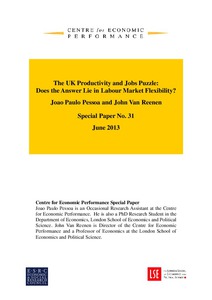The UK productivity and jobs puzzle: does the answer lie in labour market flexibility?
"GDP per worker fell for the five years after 2008 which is unprecedented in post war UK history. In this paper we argue that “capital shallowing” (i.e. the fall in the capital-labour ratio) could be the main reason for this. This is likely to have occurred due to changes in factor prices: a la...
| Main Authors: | , |
|---|---|
| Institution: | ETUI-European Trade Union Institute |
| Format: | TEXT |
| Language: | English |
| Published: |
London
2014
LSE |
| Subjects: | |
| Online Access: | https://www.labourline.org/KENTIKA-19110537124919387199-The-uK-productivity-and-jobs-p.htm |
| Summary: | "GDP per worker fell for the five years after 2008 which is unprecedented in post war UK history. In this paper we argue that “capital shallowing” (i.e. the fall in the capital-labour ratio) could be the main reason for this. This is likely to have occurred due to changes in factor prices: a large fall in real wages and increases in the cost of capital. In previous recessions real wages did not fall, but reforms to union strength and welfare have made wages more sensitive to negative demand shocks. This wage flexibility is desirable as it reduces the risks of long-term unemployment building up. After accounting for changes in capital TFP is more similar to earlier recessions and likely to be related to under-utilised resources and misallocation. The fall in labour productivity is therefore likely to reverse if demand improves – e.g. through stronger monetary or fiscal policy stimulus." |
|---|---|
| Physical Description: | 19 p. Digital |

